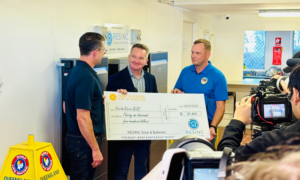Deep cycle batteries can store large amounts of power – but they are rather bulky – for example, a 260 amp hour deep cycle battery may weigh as much as 70 kilograms. Lithium-ion batteries, such as those found in notebook computers, are much lighter and able to store significant levels of energy too – but they can take a long time to recharge.
A new battery technology developed by MIT engineers dubbed "beltway battery" gets around this problem and may help propel Lithium-ion technology into the wind and solar related energy storage market much sooner than expected.
It was previously thought that lithium ions , along with electrons, that carry charge across a battery were just moving too slowly through the material. However, computer calculations of lithium iron phosphate made by the team predicted the material’s lithium ions should actually be moving very rapidly. Further calculations found that lithium ions can indeed move very quickly into the material but only through tunnels accessed from the surface – and the lithium ion at the surface must directly in front of a tunnel entrance.
Members of the team then created a new surface structure allowing the lithium ions to move quickly around the outside of the material, much like a beltway around a city; hence the name. They then made a small battery that could be fully charged or discharged in 10 to 20 seconds; compared to the 6 minutes it takes to fully charge or discharge a cell made from the unprocessed material.
An additional major benefit is unlike other battery materials, the new material does not degrade as rapidly when repeatedly charged and recharged. This could lead to smaller and far lighter batteries for deep cycle applications as less material is needed for the same result.












































